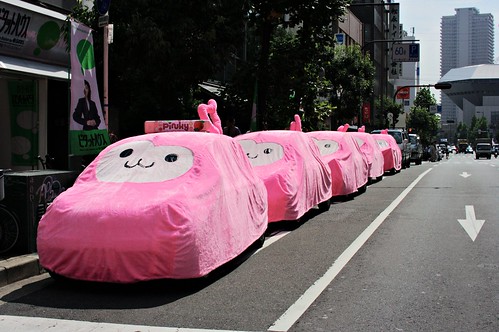Toyota is leaving Formula 1 racing. BMW has decided to quit next year, Honda left already last year, and Renault is reportedly considering leaving as well. Rally has seen losses of car company teams. Crisis for high-end racing, and it's not surprising during a severe economic recession of course, but there's perhaps more to it than that.
The generation-long rivalry between sports car maker Porsche and mass-market Volkswagen ended recently - and symbolically - with Volkswagen taking over Porsche outright (Ferrari is of course already a subdivision of Fiat). And Honda has stopped building sports cars altogether.
The sports car, the muscle car, the two-seater runabout, is - well, not disappearing, exactly; there's always going to be enthusiasts and car models that cater to them. But the era of the Fast Car is coming to an end.
The sports car has long been a small but serious market segment, important far beyond their sales numbers. They are aspirational cars, something to build your brand and lure people into your showrooms to buy one of your mainstream models. Think of how many teen-age boys have had a beloved poster of some sports car or another, and how many of those ended up getting a car from that same manufacturer when they grew older.
More people than ever have licenses and cars to drive. The car is still a very desirable item. But the nature of car ownership is changing. To more and more young people, a car is no longer a defining symbol of adulthood, and the interest in vehicles as a hobby is waning. Ask any motor club about how the median age of its members have changed over the past generation or so.
Also, the car itself is increasingly being viewed as a pollutant and as the main link still chaining us to the current oil-based economy that is increasingly seen as untenable in the long run. Instead, the cars that capture buyers imagination and grab press headlines are increasingly small and efficient cars, and the future-looking all-electric vehicles. A traditional sports car, with its thirsty engine and flashy looks, seems backwards-looking, a symbol of wastefulness as much as youthful fun. A sports car in your line-up no longer helps sell your ordinary cars; indeed, it may be a net negative.
And of course, with electric vehicles the impression of the car changes. It becomes more of an appliance, like your refrigerator, than a potent lifestyle symbol. A gasoline engine is an amazing Rube Goldberg-esque contraption of mechanical linkages and delicately balanced interactions. It is both very accessible to those who wish to tinker with it, and very temperamental, making it well worth tinkering with.
An all-electric system is different. It's far more even, more predictable and reliable, and any required tuning is done completely through software. Not that there's a huge scope for tuning; electric drive systems come pretty close to your theoretical performance limits right from the start. There's just not much fun in hacking an electric car, and plenty of high-voltage danger for anybody trying. The car hobby - car building and tuning especially - is going to have a hard time adapting to this change.
Spreading lack of interest in muscle cars, the negative brand impression of selling thirsty, wasteful gasoline vehicles, the disproportionate cost of keeping up a high-end small-volume brand, and the lack of proper return on investment on very expensive racing programs - those are the reasons that sports cars are slowly disappearing and car makers are turning away from high-end motor sports. The current recession has just accelerated a change already on the way.



Interesting read, thanks
ReplyDeleteSune/Jonson PL